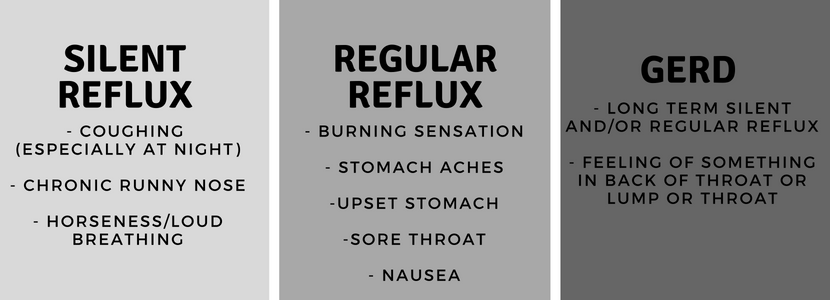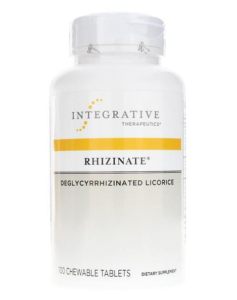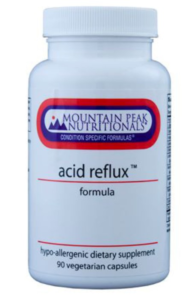
Does the thought of a glass of wine, spicy food, or even a swig of orange juice have you reaching for an antacid?
How about sitting down to happy hour and realizing you left your acid controlling medicine at home?
Or maybe it’s just the frustration of trying to sleep but the burning pain is making it unbearable to lie down?
These signs of acid reflux are all too common, but that doesn’t mean they are any less irritating. In our present western culture it’s easy to find ourselves annoyed with acid reflux. So is there something natural we can do to not only treat it, but heal it too?
YES!
The first thing to know is that there are three different types of reflux:

These refluxes happen when the sphincter (a small, circular muscle) on top of the stomach allows stomach acid to travel up through the esophagus. This can be due to aging, irritating food and beverages, and even stress.
Many general practitioners prescribe PPIs (Proton Pump Inhibitors), which reduce acid production in the stomach and relieve these symptoms. These medications are to be taken for 4-6 weeks for full relief.
The challenge with these PPIs?
Patients are staying on them longer than intended and are finding them hard to get off of. This can be due to the body getting acclimated to help with acid production and when a patient goes off of the PPI, “reflex reflux” happens, meaning the acid simply comes back and won’t go away because the body now relies on the PPI.
PPIs are to provide relief from symptoms and provide the stomach time to get back in balance. However, they are not designed to heal – they are simply assisting the body to heal itself.
And unfortunately, if the stomach lining is not healed, long term reflux can lead to painful ulcers and Barrett’s esophagus (an inflamed esophagus) that can ultimately lead to cancer.
However, what if there were options that could relieve AND heal? There are!
First, some acid in our stomach is good for us! We need acid to absorb nutrients such as iron and B12. It also helps us digest our food.
However, when we have too little or too much acid, that’s when problems arise.
Too little acid, you say?
Yes, that can be a problem just as much as too much acid. When there is too little acid in the stomach, the sphincter doesn’t recognize any acid to trigger it to close, so the little acid that is in the stomach travels up the esophagus.
How do I know if I have too much or too little acid production?
Try this test!
1. Ingest a few teaspoons of apple cider vinegar with water before each meal. This encourages an increase in stomach acid.
2. If the reflux is better, there is too low of acid in the stomach. If the reflux gets worse, there is too much.
Once you know if you have too much or too little acid in your stomach, it’s time to decrease inflammation and restore proper stomach function.
How to do this?
1. Make a CNMA Appointment. We encourage you to start with an appointment with Dr.
Graves to discuss your symptoms, how long you’ve been suffering, and what you have tried
in the past. From here, Dr. Graves will assess your condition and create a specific protocol for you to follow.
A food allergy test may also be conducted at this time to analyze any food sensitivities. Food allergy tests (click HERE for more information) can be especially helpful in treating GERD.
2. Focus on Herbs. Natural herbs and supplements are one of the keys to relieving your symptoms and healing your digestive track.
Some of the herbs we recommend are:

Integrative Therapeutics Rhizinate® – chewing one of these chocolate flavored deglycyrrhizinated licorice tablets before and/or after drinking alcohol or eating rich, spicy foods can soothe, heal, and protect the stomach lining from irritation. These can also be taken to relieve upset stomach symptoms.

Mountain Peak Nutritionals® Acid Reflux™ – packed with slippery elm, aloe vera extract, glutamine, licorice, zinc, and curcumin, this supplement with meals is great for acid reflux.

Pure Encapsulations Digestion GB® – taken before each meal, these enzymes are good for the stomach and gallbladder. Filled with taurine, milk thistle, and tumeric, it assists the stomach in breaking down food.
3. Acupuncture – Beginning with once a week for 4-6 weeks and then transitioning to maintenance sessions, acupuncture focuses on restoring the stomach function and decreasing inflammation. Acupuncture also helps calm and relax the body for less stress effects.
4. Proper Diet – Try not to overeat carbohydrates or fats. You may even consider eliminating gluten as it sometimes stimulates reflux. Stick to lighter meals, lean meats, healthy fats, and plenty of fruits and vegetables.
5. Home Remedies – If you’re in a bind and need symptom relief now, home remedies can be welcoming and helpful.
Try:
– a few teaspoons of apple cider vinegar with the mother before meals
– a cup of milk to soothe the acid
– a half teaspoon of baking soda in a glass of water
– a warm glass of ginger tea
– repositioning yourself – sit up straight or place extra pillows for better sleep
– go for a walk, do a little movement to release stress
These 5 steps can eliminate your reflux and begin to heal your stomach. Are you ready to start feeling better?
If you live in Castle Rock, Castle Pines, Parker, Centennial, Highlands Ranch, Larkspur, Monument, Lone Tree, Colorado Springs, or the greater Denver Metro area, please contact us at (303) 688-6698 or schedule online for your free 15 minute phone consultation with Dr. Graves.
Get started now and squelch that reflux!

Leave a Reply